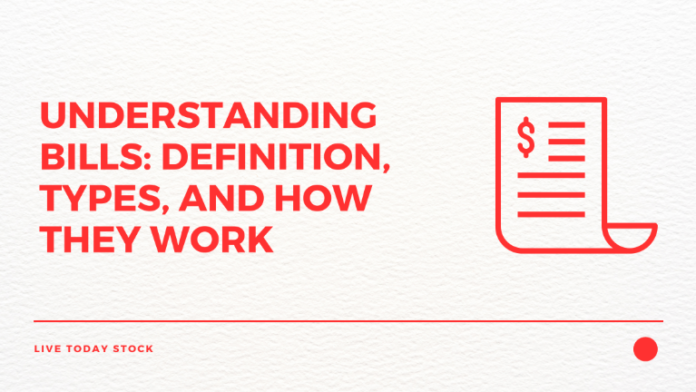A bill is a formal written document that outlines a financial obligation or request for payment. In this comprehensive guide, we’ll explore what bills are, the different types of bills, and how they function in various contexts.
What is a Bill?
A bill is a legal document that serves as evidence of a financial transaction or obligation. It can be in the form of a written invoice, statement, or request for payment, and it typically includes details such as the amount owed, the due date, and the recipient of the payment.
Types of Bills
- Utility Bills: Bills issued by utility companies for services such as electricity, water, gas, and sewage. Utility bills outline the charges for usage during a specific billing period and provide instructions for payment.
- Credit Card Bills: Statements issued by credit card companies to cardholders, detailing their transactions, outstanding balances, minimum payment due, and payment due date. Credit card bills may also include interest charges and fees.
- Medical Bills: Invoices issued by healthcare providers for medical services rendered to patients. Medical bills include charges for consultations, treatments, procedures, medications, and other healthcare-related expenses.
- Tax Bills: Notices issued by government authorities, such as the Internal Revenue Service (IRS) or local tax authorities, informing taxpayers of their tax liabilities and payment due dates. Tax bills outline the amount owed in taxes, including income taxes, property taxes, and sales taxes.
How Bills Work
- Issuance: Bills are typically issued by service providers, vendors, creditors, or government agencies to individuals or businesses with outstanding financial obligations.
- Delivery: Bills may be delivered to recipients through various channels, including mail, email, online portals, or mobile apps, depending on the preferences of the issuing entity.
- Payment: Recipients of bills are responsible for reviewing the details of the bill, verifying the accuracy of the charges, and remitting payment by the specified due date. Payment methods may include cash, check, credit card, bank transfer, or online payment platforms.
Conclusion
Bills are essential documents that play a crucial role in financial transactions and obligations. By understanding the different types of bills, their features, and how they work, individuals and businesses can effectively manage their finances and fulfill their payment obligations in a timely manner.

